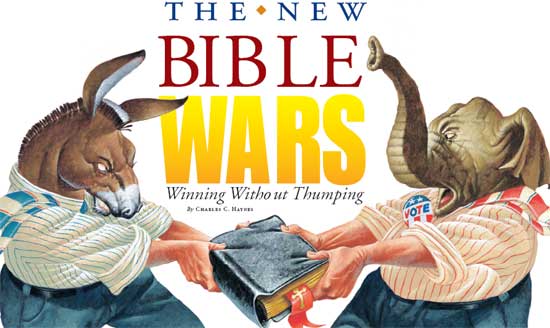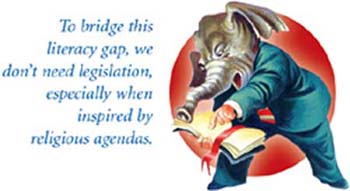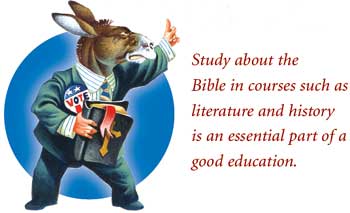The New Bible Wars
Charles C. Haynes November/December 2006
Getting your Trinity Audio player ready...

Over the past year, new fights have broken out in states across the nation about Bible courses in public schools. Competing "Bible bills" have popped up in various state legislatures, with Republicans and Democrats vying to see who can thump the Bible the loudest.
First prize goes to Georgia Republicans. In March 2006 the Georgia legislature voted 151-7 in the House and 50-1 in the Senate for the first-in-the-nation "Bible bill," calling for Bible electives to be taught in Georgia's high schools.
Although Georgia schools were already free to offer Bible electives, the bill provides state funding and curriculum to encourage widespread adoption of Bible courses. Similar legislation has been proposed in Alabama, Tennessee, and Missouri; proponents promise more states to come.
If these efforts were only about Bible literacy, this flurry of Bible bills might pass unnoticed. After all, there is no constitutional barrier to teaching about the Bible in public schools. The Supreme Court has ruled against state-sponsored devotional Bible reading, but the Court has never banned the Bible from the curriculum. In Abington v. Schempp(1963), Justice Tom C. Clark wrote for the Court:
"It certainly may be said that the Bible is worthy of study for its literary and historic qualities. Nothing we have said here indicates that such study of the Bible or of religion, when presented objectively as part of a secular program of education, may not be effected consistently with the First Amendment."

As any educator will tell you, study about the Bible in courses such as literature and history is an essential part of a good education. Without some knowledge of the Bible, students can't grasp much of what they see in museums, read in literature, or encounter in history and current events. Moreover, without biblical literacy students will have little understanding of the great religious and ethical ideas that have shaped much of Western civilization.
Unfortunately, however, the spate of Bible bills in Georgia and other states appear to be less about education and more about partisan politics and stealth attempts to promote one religious view of the Bible in public schools.
Playing Politics With the Bible
The first of these Bible bills appeared in Alabama, where Democrats in the legislature proposed electives that would use a textbook, The Bible and Its Influence, published by the Bible Literacy Project in 2005. Because the textbook has broad support from Jews and Christians, was reviewed by 41 scholars (disclosure: I was among the reviewers), and successfully field-tested, the Democrats saw this as a golden opportunity to do something both religion-friendly and constitutional.

Not surprisingly, Alabama Republicans were not about to let Democrats steal their biblical thunder. Although in the minority, GOP lawmakers have thus far managed to block passage of the Democrats' bill.
Georgia was a different story. Once again, Democrats went first, proposing Bible electives using The Bible and Its Influence. Once again, Republicans fought back, accusing Democrats of "trying to put a wolf in sheep's clothing." Since the GOP controls both houses, they scuttled the Democratic bill and passed their alternative.
Beyond the fact that they were put forward by Democrats, why did Republicans in Alabama and Georgia reject the original Bible bills? It turns out that the dispute is about much more than partisan jockeying over which party is more on God's side. It's really about how public schools should treat the Bible in the classroom.
Democrats in both states had no sooner proposed The Bible and Its Influence when supporters of an alternative approach from a group called the National Council on Bible Curriculum in Public Schools mobilized to defeat it with a political two-step: First, discredit the textbook in the Democratic bill. Then, get Republicans to endorse an alternative approach that just happens to reflect the National Council's own curriculum.
National Council advisory board member and prominent evangelical minister D. James Kennedy labeled the textbook "anti-biblical" and claimed that it was supported by the American Civil Liberties Union (kiss of death) and the Council on Islamic Education. In truth, The Bible and Its Influence has been praised by many Jewish, Catholic, and Protestant leaders, including evangelicals such as Chuck Colson. Neither the ACLU nor the CIE has endorsed it. But the smear campaign worked.
Competing Approaches to Bible Electives
What many religious leaders and scholars like about The Bible and Its Influence is that it puts the Bible in historical context, exposes students to how Jews and Christians understand the Bible in various ways, and illustrates how the Bible has shaped history, literature, and the arts. Contrary to the false claims made by the National Council, students using the textbook are required to read the Bible itself. But teachers and students are given sound scholarship and historical context for understanding the Bible.
If any textbook can provide a safe approach for public schools seeking to create a Bible elective, this may be it. Why? Because it is written to conform to constitutional and educational standards laid out in "The Bible and Public Schools: A First Amendment Guide," written and endorsed by a wide range of national organizations ranging from the National Association of Evangelicals and the Christian Legal Society to People for the American Way Foundation and the American Jewish Congress. (The guide is available at www.firstamendmentcenter.org)
The National Council's curriculum, by contrast, doesn't have a student textbook (the Bible, they say, is the textbook). It is instead a lengthy workbook for the teacher that, in places, treats the Bible like a history book. The vast majority of secondary resources recommended for classroom use are from an evangelical Christian perspective.
According to a report issued by the Texas Freedom Network, written by biblical scholar Mark Chancey of Southern Methodist University, the National Council's curriculum "advocates a narrow sectarian perspective taught with materials plagued by shoddy research, blatant errors and discredited or poorly cited sources." (The full report is available at www.tfn.org)
The Georgia legislation doesn't mention the National Council by name, but GOP lawmakers have cited the Council's "successful approach." And the language of the bill reflects the National Council's materials by mandating the Bible as the textbook, calling for teaching "the history recorded there," and listing topics to be studied that are consistent with the Council's curriculum.
Although the National Council claims that its materials have been successfully adopted in hundreds of school districts (they won't reveal where), I have gotten calls from communities in several states where the approach taken in the Council's curriculum has sparked controversy and threats of lawsuits.

Beyond the Conflict
The political fight over Bible electives is just the latest chapter in a long history of conflict over the Bible in public education. No sooner had "common schools" opened their doors in the nineteenth century than a bitter struggle broke out between Protestants and Catholics over whose version of the Bible would be read each morning. Lawsuits in the mid-twentieth century led to Supreme Court decisions striking down devotional Bible-reading by school officials. And now in the twenty-first century, school officials are faced with new battles over Bible courses.
Getting beyond the confusion and conflict about the Bible and public schools would be good for education, but it won't be easy. According to a study commissioned by the Bible Literacy Project (BLP) in 2005, most students in public schools don't know much about the Bible—and most teachers are hesitant to teach about it.
True, most students polled could identify Moses correctly (72 percent) and knew about Adam and Eve (90 percent). But when probed for a more substantive knowledge of the Bible, such as David's actions in the books of Samuel or what happened at the wedding of Cana as described in the New Testament, a large majority didn't know.
But does this matter? Apart from religious arguments for knowing the Bible (which aren't the business of public schools), what are the educational reasons for taking the Bible more seriously in the curriculum?
If you ask the nation's top English teachers, they will tell you. Forty of the 41 teachers surveyed for the BLP study believe that knowledge of the Bible is essential. "It's impossible to understand Western literature without it," said one teacher. Not to mention much of Western art, music, and history.
The teachers agreed that lack of biblical literacy puts students at a distinct academic disadvantage. Consider this: One preparation guide for the advanced-placement literature and composition exam lists more than 100 allusions students should know—and more than 60 percent of them are biblical references. The list includes everything from Abraham and Isaac to "through a glass darkly."
In spite of the clear academic need, most high schools (58 percent) have little or no teaching about Bible literature in their English courses. As for actual Bible literature courses, all four private schools surveyed have such courses, but only two of the public schools have electives in the Bible as literature. (For more information about the survey and the Bible Literacy Project, see www.bibleliteracy.org)
To bridge this literacy gap, we don't need legislation, especially when inspired by religious agendas. What we do need are high academic standards for classroom materials and adequate teacher preparation for anyone assigned to teach about the Bible in a public school.
The Bible Literacy Project is good news for schools that want to include more study about the Bible without violating the First Amendment. The Bible and Its Influence, with the teacher guide and online university-based teacher training program, is designed to be one way to provide a constitutional and academic safe harbor for teaching about the Bible in a public school classroom.
Whether or not it's a good idea to offer a Bible elective and just how much students need to learn about the Bible in literature and history are issues for educators and school boards to decide. But any school district that contemplates adding a Bible course—in Georgia or anywhere else—can avoid a fight only by first understanding and applying the religious liberty principles of the First Amendment to the U.S. Constitution.